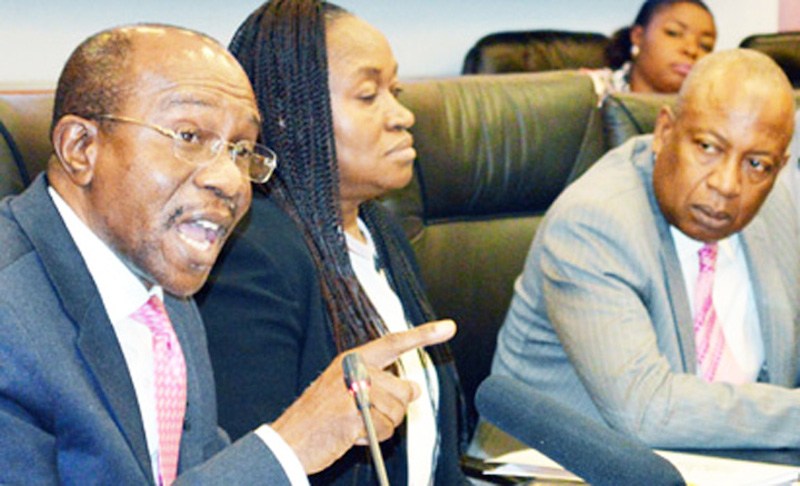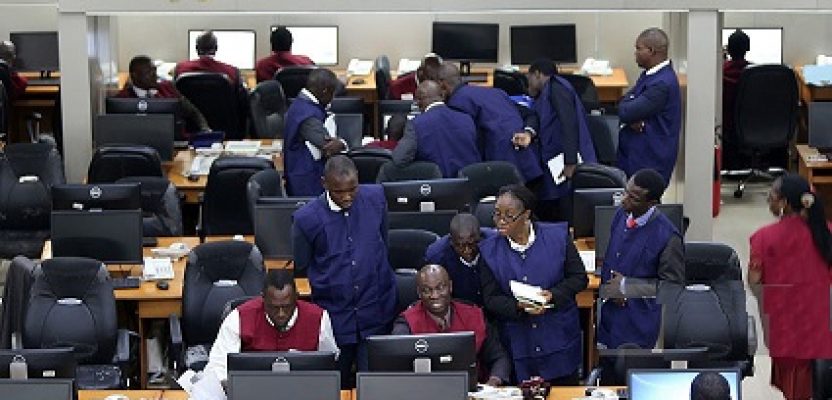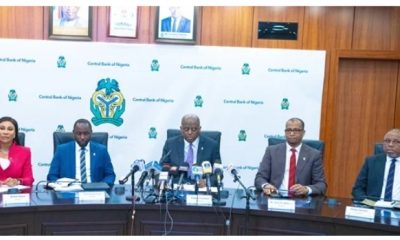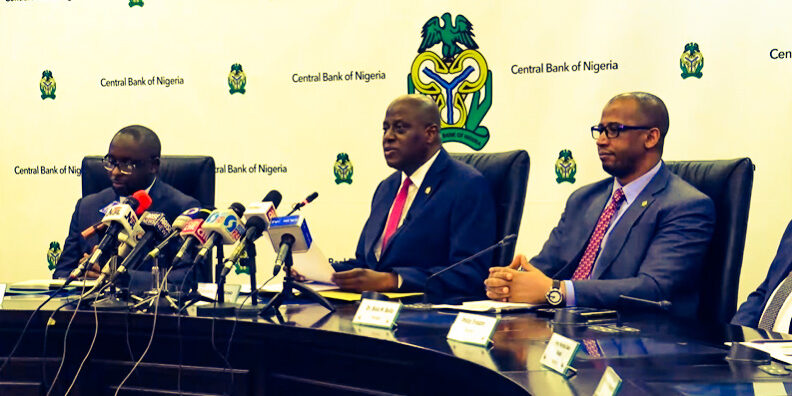Economy
FSDH Urges MPC to Ease Monetary Policy to Stimulate Growth

By Modupe Gbadeyanka
As the Central Bank of Nigeria (CBN) prepares to hold its first Monetary Policy Committee (MPC) meeting of 2018 next week, one of the leading investment firms in the country, FSDH Research, has advised the committee to consider cutting its rates so as to “boost credit creation and stimulate economic growth.”
In a report released on Thursday, analysts at FSDH said they would expect the MPC to consider a drop in either the Monetary Policy Rate (MPR), which is currently at 14 percent, or the Cash Reserve Ration (CRR), presently at 22.50 percent.
The investment company noted that although the GDP growth rate in Nigeria improved further in Q4 2017 at 1.92 percent from 1.40 percent in Q3 2017, the recovery was still very fragile, emphasising that additional monetary policies were required to stimulate a broad-based growth.
“FSDH Research’s analysis of the growth pattern in 2017 shows that two sectors; agriculture and, mining and quarrying were the major drivers of growth. They were the two sectors out of the six largest sectors of the Nigerian economy that recorded growth in 2017. Other leading sectors which are trade, information and communication, manufacturing, and real estate all contracted. Thus, the need for monetary policy easing,” it said.
FSDH Research said looking at the developments in the international market; the economic outlook in the major advanced countries is strong in the short-term to medium-term, necessitating monetary policy normalisation.
It said the outlook of the GDP growth rate remains strong, the unemployment rate is low in most regions and should remain low in the short-term, while inflation rate is trending up.
The Federal Open Market Committee (FOMC) of the United States (U.S) Federal Reserve (The Fed) increased the Federal Funds Rate (Fed Rate) at its March 2018 meeting. The Fed increased the Fed Rate to 1.50 percent – 1.75 percent from 1.25 percent -1.50 percent.
“FSDH Research expects that the FOMC will increase the Fed Rate to 2.25 percent – 2.50 percent by year end. The increase in the interest rate should lead to increase in the yields on the fixed income securities in the advanced markets, with the attendant possible increase in capital flights from the emerging markets,” the report said.
According to FSDH, the increase in the crude oil price and favourable crude oil production in Nigeria have increased capital inflows and also led to favourable trade balance. Consequently, the country’s external reserves (30-Day Moving Average) increased substantially in the last five months, growing to $46.04 billion as at March 26, 2018.
It said this provides additional short-term stability for the value of Naira.
However, FSDH Research recognised the vulnerabilities of the Nigerian economy to the adverse movements in the crude oil prices. Thus the need to stimulate other non-oil sectors to reduce these vulnerabilities, it said.
Continuing, FSDH Research noted that the current strategies of the Debt Management Office (DMO) to reduce the interest expense on the debt of the Federal Government of Nigeria (FGN) were working.
It pointed out that the latest debt figures show that the interest expense on the local debt has dropped in the last few months.
The investment firm also observed a relative increase in the revenue accrued to the FGN from the Federation Account Allocation Committee (FAAC). These two factors have led to a drop in the ratio of the interest expense to the FGN FAAC revenue which stood at 20% in December 2017. Thus the yields on the fixed income securities in the market have dropped substantially in the last six months, it said.
Although FSDH Research said it believes the yields on the NTBs may drop further, it is of the view that the yields on the FGN Bonds may move up gradually from the current level as the FGN starts to borrow to fund the 2018 budget.
It said despite the drop in the yields on fixed income securities in Q4 2017, Nigeria recorded the highest Foreign Portfolio Investments (FPIs) inflows in 2017 during the last quarter.
This, it explained, implies improving confidence on the short-term outlook of the Nigeria economy.
FSDH Research also noted that the growth in money supply as at December 2017 was lower than the CBN’s target for the year.
The broad money (M2) grew by 2.62 percent, lower than the target of 10.29 percent, while the net domestic credit contracted by 2.95 percent as against the target of 17.93 percent. The net credit to the private sector grew marginally by 1.40 percent, lower than the target of 14.88 percent.
It pointed out that the need to curb high inflation rate and maintain stability in the foreign exchange market were the main reasons for the contractionary monetary policy.
FSDH Research said it believes the inflation rate may drop to single digit mid-year, while the exchange rate should remain stable in the short-term.
“Therefore, there is a need for monetary policy easing to boost credit creation and stimulate economic growth,” it averred.
Concluding, FSDH Research said looking at the short-term outlook of the Nigerian economy, it believes the MPC should begin monetary policy easing to signal the end of its monetary policy tightening cycle.
The CBN will hold its first MPC meeting on Tuesday, April 3 and Wednesday, April 4, 2018.
At its last meeting in November 2017, the committee maintained the MPR at 14 percent, with the asymmetric corridor at +200 and -500 basis points around the MPR; and the CRR and Liquidity Ratio (LR) left at 22.50 percent and 30 percent respectively.
Economy
Customs Urges Freight Forwarders to Adopt Automated Licence, Permit System

By Adedapo Adesanya
The Nigeria Customs Service (NCS) has urged freight forwarders to adopt its automated Licence and Permits Processing system to reduce the cost of doing business.
This advice was given by the Assistant Comptroller-General of Customs, Mr Muhammed Babadede, during a stakeholders’ engagement on automation held in Lagos on Monday.
He noted that the reform responds to longstanding demands for faster, more transparent and simpler procedures for industry stakeholders, disclosing that Comptroller-General of Customs, Mr Bashir Adeniyi, has approved the full automation of the service’s licences and permits processes.
“For years, stakeholders dealt with paperwork, long queues and uncertainty from manual processing. Those days are coming to an end.
“This sensitisation is across all zones. The goal is to ensure stakeholders understand the automated system before implementation,” Mr Babadede said.
He said automation would enable applications and renewals from offices or mobile phones, eliminating visits to customs formations, assuring stakeholders of a fair and consistent process, and reducing errors associated with manual documentation.
He said automation would improve record-keeping, supervision and service delivery without increasing pressure on officers.
The Deputy Comptroller-General, Tariff and Trade, CK Naigwan, also represented by Mr Babadede, reiterated management’s commitment to seamless implementation.
Meanwhile, the Comptroller of Customs for Licence and Permit Unit, Mrs Ngozika Anozie, praised the Comptroller-General for driving innovation within the Service, saying the automation aligns Customs procedures with global best practice and strengthens institutional efficiency.
According to her, the reform reflects the three-point agenda of the Chairman of the World Customs Organisation, Mr Adeniyi, centred on consolidation, collaboration and innovation.
She said the system would enhance the ease of doing business in the maritime sector and boost national revenue generation.
“Automation will cut business costs and reduce travel risks for stakeholders
“They will no longer travel repeatedly to Abuja, paying for transport, hotels and feeding to process licences and permits,” she said, adding that the platform would automatically reject fake documents and accept genuine submissions, curbing fraudulent practices.
“The CGC is determined to sanitise the system, and we are committed to achieving that objective,” Mrs Anozie said.
On his part, the Assistant Superintendent of Customs, Mr Ibrahim Usman, said the Licence and Permit Unit operates under the Tariff and Trade Department.
He explained that the unit ensures proper issuance of licences and permits and compliance with import regulations.
Mr Usman said all licences and permits expire on December 31 of their issuance year.
He added that the portal would become fully operational after nationwide sensitisation, with stakeholders duly informed.
Customs Area Controller, Tincan Island Command, Mr Frank Onyeka, thanked stakeholders for their continued support.
He urged them to take the exercise seriously to achieve seamless processing across Customs operations.
Stakeholders raised concerns about online payment integration and potential technical disruptions.
Officials addressed the questions and pledged continued engagement to ensure smooth implementation nationwide.
Economy
Oyedele Links Nigeria’s Stock Market Surge to Fiscal Reforms

By Adedapo Adesanya
The Chairman of the Presidential Committee on Fiscal Policy and Tax Reforms, Mr Taiwo Oyedele, has linked the surge in the nation’s stock market to ongoing fiscal reforms aimed at strengthening investor confidence and stabilising the economy.
Speaking at the 3rd PUU Capital Market Colloquium on Monday in Abuja, Mr Oyedele described the ongoing reforms as one of the most consequential fiscal resets in Nigeria’s modern history, noting that they are designed to build trust in the economy, stimulate inclusive growth, and foster a more investment-friendly environment.
According to him, the impact of these reforms is already visible on the trading floor of the Nigerian Exchange (NGX) Limited. As of mid-February 2026, the All-Share Index recorded a 25.3 per cent return within the first seven weeks of the year, while market capitalisation crossed the psychological N100 trillion mark in January before reaching an all-time high of over N125 trillion by February 20.
On January 13, 2026, the index reached an all-time high of 165,837.33 points, extending a rally that had already delivered a 51.2 per cent return in 2025, the strongest performance in nearly two decades.
Mr Oyedele linked the strong performance to structural reforms that had improved transparency, enhanced foreign exchange liquidity, and provided greater predictability in tax administration.
“The results of these policies are already evident on the trading floor. As of mid-February 2026, the Nigerian Stock Exchange (NGX) showed exceptional performance with the All-Share Index (ASI) recording a robust 25.3 per cent return in just the first seven weeks of the year, with market capitalisation crossing the psychological N100 trillion mark in January, and reaching an all-time high of over N125 trillion by 20 February 2026.
“Confidence continues to grow from both foreign and domestic investors, driven by the structural reforms and strong performance in key sectors like energy, industrial and financial services,” he said.
He explained that historically, Nigeria’s tax system had been fragmented and costly to comply with, discouraging investment and limiting efficient capital allocation.
“To address this, the new tax framework provides a unified, transparent and predictable environment where businesses can plan effectively, and investors can price risk appropriately,” he said.
He outlined several provisions in the new tax laws aimed at deepening the capital market. These include a full Capital Gains Tax exemption on proceeds reinvested in Nigerian shares within the same year, higher tax-exempt thresholds for small and retail investors, and a legal framework to reduce corporate income tax from 30 per cent to 25 per cent.
Other measures include the removal and reduction of certain transaction taxes, such as stamp duties on share transfers and withholding tax on bonus shares, as well as provisions that protect foreign investors from being taxed on naira gains without accounting for foreign exchange losses.
He emphasised that the ultimate goal is not merely to celebrate rising market indices but to translate financial market growth into tangible economic development, including financing for infrastructure, factories, innovation and job creation.
Economy
Unlisted Securities Shed 0.21% on Profit-taking

By Adedapo Adesanya
It was a bad day for the NASD Over-the-Counter (OTC) Securities Exchange on Monday, February 23, after it slumped 0.21 per cent at the close of business.
This pullback was influenced by profit-taking by investors in four securities, which overpowered the gains recorded by six others.
According to data, Central Securities Clearing System (CSCS) Plc dipped N3.79 to sell at N67.21 per unit compared with the previous N71.00 per unit, UBN Property Plc lost 13 Kobo to close at N1.98 per share versus N2.11 per share, Resourcery Plc fell 3 Kobo to 36 Kobo per unit from 39 Kobo per unit, and Geo-Fluids Plc depreciated 1 Kobo to close at N3.31 per share versus N3.32 per share.
As a result, the bourse’s market capitalisation went down by N5.04 billion to N2.384 trillion from N2.389 trillion, and the NASD Unlisted Security Index (NSI) decreased by 8.42 points to 3,985.90 points from 3,994.32 points.
Business Post reports that NIPCO Plc rose N23.00 to N253.00 per unit from N230.00 per unit, MRS Oil Plc added N14.50 to close at N214.50 per share versus N200.00 per share, FrieslandCampina Wamco Nigeria Plc grew by N1.85 to N93.40 per unit from N91.55 per unit, NASD Plc soared 40 Kobo to N51.28 per share from N50.88 per share, First Trust Mortgage Bank Plc advanced by 12 Kobo to N1.32 per unit from N1.20 per unit, and Food Concepts Plc improved by 6 Kobo to N3.76 per share from N3.70 per share.
As for the trading data, the volume of securities jumped 99.7 per cent to 7.3 million units from 3.7 million units, but the value depleted by 26.8 per cent to N61.8 million from N84.5 million, and the number of deals slipped 7.1 per cent to 39 deals from 42 deals.
At the close of trades, CSCS Plc was the most active stock by value (year-to-date) with 32.9 million units sold for N1.9 billion, followed by Geo-Fluids Plc with 120.6 million units valued at N473.4 million, and Resourcery Plc with 1.05 billion units exchanged for N408.7 million.
Resourcery Plc closed the session as the most active stock by volume (year-to-date) with 1.05 billion units worth N408.7 million, followed by Geo-Fluids Plc with 120.6 million units valued at N473.4 million, and CSCS Plc with 32.9 million units traded for N1.9 billion.
-

 Feature/OPED6 years ago
Feature/OPED6 years agoDavos was Different this year
-
Travel/Tourism10 years ago
Lagos Seals Western Lodge Hotel In Ikorodu
-

 Showbiz3 years ago
Showbiz3 years agoEstranged Lover Releases Videos of Empress Njamah Bathing
-

 Banking8 years ago
Banking8 years agoSort Codes of GTBank Branches in Nigeria
-

 Economy3 years ago
Economy3 years agoSubsidy Removal: CNG at N130 Per Litre Cheaper Than Petrol—IPMAN
-

 Banking3 years ago
Banking3 years agoSort Codes of UBA Branches in Nigeria
-

 Banking3 years ago
Banking3 years agoFirst Bank Announces Planned Downtime
-

 Sports3 years ago
Sports3 years agoHighest Paid Nigerian Footballer – How Much Do Nigerian Footballers Earn





















